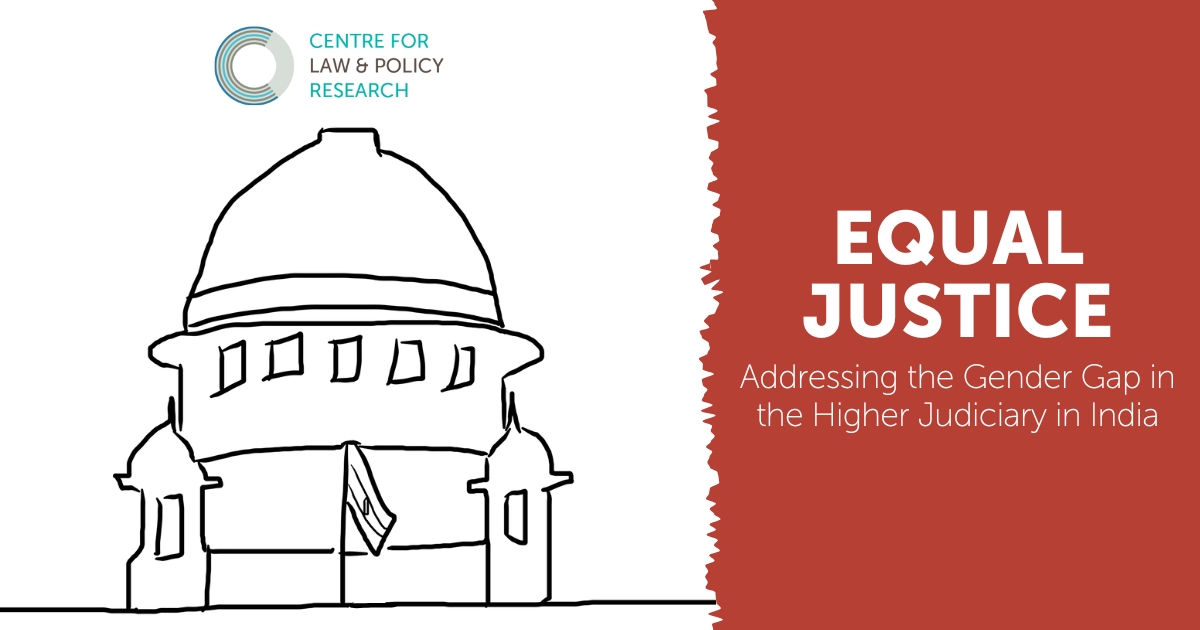
CLPR has launched a research and advocacy initiative aiming to address the glaring gender gap in the higher judiciary and to secure equal and inclusive representation of women.
When we examine the status of women in the Indian legal system, one of the biggest and most glaring problems we see is the significantly low numbers of women occupying positions in the higher judiciary being the High Courts and the Supreme Court.
Women comprise only a small fraction of judges in the higher judiciary. Currently, the Supreme Court has only 3 female judges (8.82%) out of its working strength of 34 judges, and only 8 judges (4%) in the Supreme Court have been female. India has never had a woman Chief Justice of India since 1950, and the first woman who will become Chief Justice is Justice Nagarathna, but only for a few days in 2025. Out of 779 permanent and additional judges in the High Courts across India, only 105 are female judges (13.47%). Only 12 out of 242 judges in the High Court Chief Justices have been women, i.e. less than 5% of the total. Even amongst these low numbers, the number of women from marginalized backgrounds such as from the non-privileged castes – Dalit / Adivasi women, Muslim and Christian women (minority religions), women who are first generation lawyers and women from socio-economic disadvantaged backgrounds, is almost negligible. The opportunities are particularly skewed when it comes to elevation of women lawyers from the Bar to the higher judiciary, as against women from the lower judiciary being promoted to the High Courts and the Supreme Court.
Factors that contribute to women’s pathways to leadership and elevation being obstructed include:
- Collegium system of appointment: One of the main barriers that women face due to which they do not get appointed to the higher judiciary is the opaque appointment procedure, lack of transparency, absence of an application process or a national judicial appointment commission. Judges are presently appointed to the High Courts and the Supreme Court by the senior judges themselves who form a collegium system. The opaque methods of appointments disadvantage women and especially women from marginalized backgrounds.
- Deep-rooted Patriarchy and Sexism: The underrepresentation of women in the higher judiciary is a result of institutional obstacles and deep-rooted gender biases against women. Women are not recommended for judgeship, which lies in the hands of the members of the Collegium, and female lawyers who are nominated face heightened scrutiny for judgeship and higher eligibility barriers, perpetuating gender inequalities.
- Infrastructure Challenges: The challenges faced by women judges are worsened by the lack of supportive policies to address sexual harassment and discrimination. This hinders their professional advancement and leads to their underrepresentation in higher judicial positions. The lack of inclusive infrastructure such as childcare facilities and gender-sensitive amenities, further marginalizes women in the legal profession.
This not only affects women lawyers in the High Court and Supreme Court who do not get equal opportunities for advancement in the legal profession, it is also women and gender diverse law students and future lawyers who do not get to see enough role models for themselves in positions of leadership in the judiciary but also the entire legal system because the lack of women would fail to build trust and legitimacy of the judiciary.
Click below to view the infographics, breaking down some of the data points.
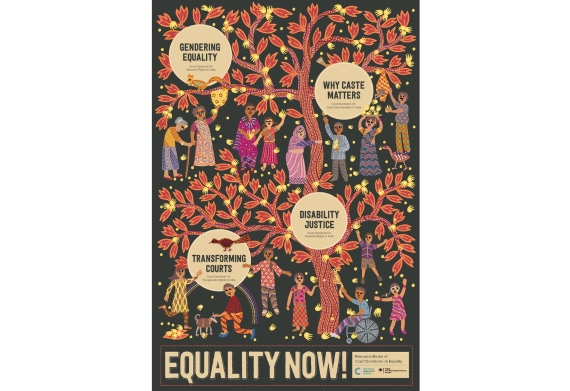
The Equality Now! series makes accessible complex court decisions through concise and easy to read summaries, providing the activists an effective advocacy tool, increasing awareness among students and the larger community, and serving as a ready reckoner for legal practitioners, judges and other authorities involved in implementing the law. The books highlight the key judgments that have shaped the legal discourse and made a significant impact on the rights of marginalised persons. The books are as follows:
- Disability Justice: Court Decisions on Disability Rights in India
- Why Caste Matters: Court Decisions on Caste Discrimination in India
- Transforming Courts: Court Decisions on Transgender Persons’ Rights in India
- Gendering Equality: Court Decisions on Women’s Rights in India
With the aim of making this process participatory and inclusive of the communities we seek to serve, CLPR conducted 4 National Consultations, one for each book, inviting feedback on our draft. The Consultations included leading community activists, academics, lawyers and experts in the field. The feedback received during these consultations was instrumental in shaping the structure and content of the books. To enhance accessibility, QR Codes linking to free and accessible versions of the judgments were incorporated, including screen-reader-friendly formats.
Our mission with these books extends beyond mere documentation; we aim to inspire future advocacy and policy reforms that can further advance the rights of marginalized groups. We believe that by providing these comprehensive resources, we empower a broader audience to engage with and uphold the principles of equality and justice.
The Equality Now! Series was made possible with the support of the Embassy of the Federal Republic of Germany. Access to free versions of judgments was provided with support from Manupatra. Cracker & Rush contributed to the layout and design of the Resource Books.
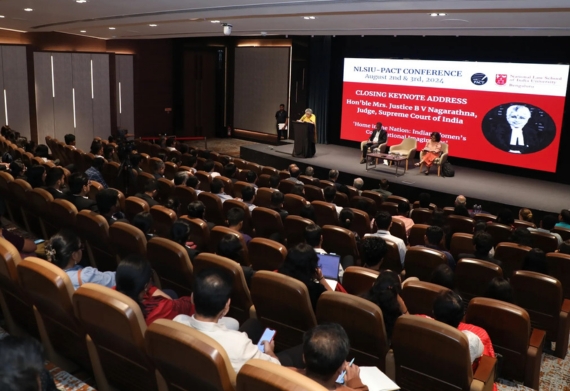
Since October 2022, the Centre for Law and Policy Research (CLPR) is participating in a three-year long research project titled ‘Pluralist Agreement and Constitutional Transformation’ (PACT).
The project is led by Prof. Rochana Bajpai, SOAS as principal investigator with Vineeth Krishna, CLPR sering as a co-investigator. Other co-investigators are Dr. Nicholas Cole, University of Oxford, Dr. Udit Bhatia, University of York, and Dr. Prof. Sudhir Krishnaswamy, National Law School of India University.
The PACT project will create an advanced digital platform on the making of the Indian constitution (1950). The Indian Constituent Assembly (1946-49) met against the background of transfer of power from the British, partition, Hindu-Muslim blood-shed, and the largest mass migration in history. It is during these challenges and disagreements along the lines of religion, caste and linguistic differences that the constitution was drafted, a document that continues to shape contemporary politics.
This research will aim to draw lessons regarding the democratic legitimacy of constitutions from the Indian example, while analysing its unfulfilled potential for pluralism and democracy in the present. The research also aims to shed light on the role of collective practices of petition, debate, and protest by citizens and the marginalized in the making of constitutions, and their remaking over time.
Using the methodologies and software developed at Pembroke College by the Quill Project, the project will create an extensive digital record of the proceedings from 1946 to 1949 that led to the formation of the Indian constitution. Alongside these plenary debates of the Indian Constituent Assembly, the project will also include committee discussions, petitions, public responses and the wider debate of the period. This broad collection of sources will allow further study into the context of public opinion against which the Indian constitution was authored.
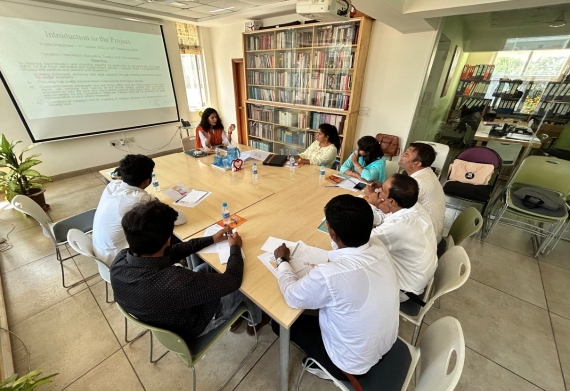
This project targets transgender persons, women and girls, persons with disabilities, and Dalit, Adivasi, and Bahujan communities, all of whom have historically faced social exclusion, discrimination, and lack of access to education, healthcare, and employment.
Recognizing this, the State has enacted laws such as the Transgender Persons (Protection of Rights) Act, 2019, Scheduled Caste and Scheduled Tribe (Prevention of Atrocities) Act, 1989, and Persons with Disabilities Act, 2016. However, many individuals remain unaware of their rights and face barriers in accessing legal services, including lack of resources, awareness of legal aid, and affordable legal representation.
The Constitution Defenders Project aims to enhance access to justice for these vulnerable groups in across India through:
- Paralegal Training: Community members will be trained to assist with legal applications, RTI requests, interactions with police, welfare schemes, and authorities like Protection Officers and Disability Commissioners.
- Constitution Defender Fellows: Young lawyers will undertake a 2.5-year fellowship to provide legal representation, hold legal clinics, conduct Know-Your-Rights sessions, and offer specialized legal assistance.
CLPR will mentor, support, and build the capacities of this cadre of paralegal volunteers and constitutional defender fellows in a sustained manner to ensure that marginalized groups have access to high-quality and effective legal services, thereby significantly improving their access to justice.
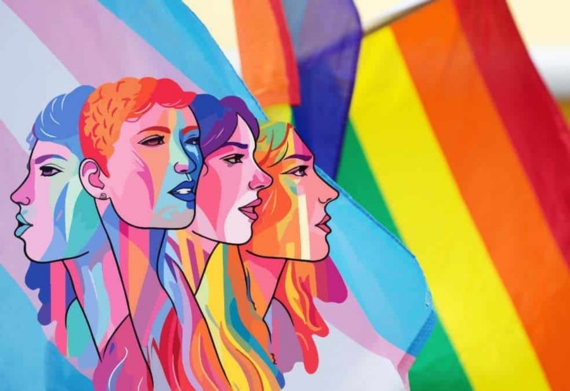
CLPR concentrates on strengthening its work on transgender rights and contribute to the development of trans equality in India through three initiatives namely the Trans Law Cell, the Global Trans Law Database, and Know Your Rights and Entitlement Session (KYRE) and Roundtable Conference on Transgender Issues.
The South Asian Translaw Database supports law and policy engagement efforts by the transgender community, legal professionals, government officials and academics from the South Asian region and beyond. The Database includes, primary legislation & rules from international, national and provincial levels, policy documents created by governments and civil society, and court cases including court documents and decisions relevant to the rights of transgender, non-binary and intersex persons.
The Trans Law Cell is an initiative by CLPR that provides free legal aid and advice to the transgender community, and empowers members of the trans-community to better understand, and fight for, their rights. It is a free walk-in legal clinic which takes place every week on Tuesdays, between 5-6 PM. Besides matters of legal documentation, the Trans Law Cell is open to providing all and any kind of legal aid to transgender persons. The Cell has also provides legal advice to persons who wish to establish inclusive societies within corporate firms, to ensure that there is no discrimination based on gender and gender identity in corporate environments. The Trans Law Cell does not require prior registration or appointments.





